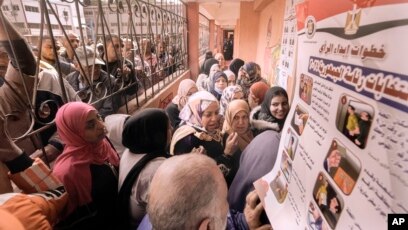Egyptians are voting this week in a Senate election largely seen as a formality, with a dominant pro-government bloc facing minimal opposition. The two-day vote, which began on Monday, will fill 200 of the 300 seats in the upper house of parliament. The remaining 100 seats will be appointed directly by President Abdel Fattah al-Sisi, who has held power since ousting Islamist president Mohamed Morsi in 2013.
Of the elected seats, 100 are contested by individual candidates, while the other half are determined by a closed party list system. The “National List for Egypt” coalition, led by the pro-Sisi Mostaqbal Watan (Nation’s Future) party, is running virtually unopposed in the party list vote. The coalition includes other parties like the National Front, led by former minister Essam al-Gazzar, and backed by influential businessman Ibrahim al-Organi, a staunch ally of Sisi.
Traditional opposition parties, including the liberal Wafd and leftist Tagamoa, have also aligned themselves with the ruling bloc, further diluting any real competition. In the individual candidate race, more than 400 candidates are vying for 100 seats, though many are also affiliated with pro-government parties.
The Senate, reinstated in 2019 after being dissolved in the aftermath of the 2011 revolution, serves mainly a consultative role. However, its recommendations are often adopted by the more powerful lower house, which is likewise dominated by pro-government forces.
Voter engagement appears low, with little campaigning on the ground beyond promotional text messages sent by coalition parties. The electoral environment reflects the broader political climate under Sisi’s rule, characterized by a lack of meaningful opposition and a sustained crackdown on dissent. Rights groups claim tens of thousands of political prisoners remain detained despite the government’s 2022 launch of a “national dialogue” initiative aimed at engaging opposition voices.
Preliminary results of the first round are expected by August 12, with a second round planned later this month. Final results will be released on September 4. The Senate will serve a five-year term, with at least 10 percent of its members required to be women. Parliamentary elections for the lower house are scheduled for November.

